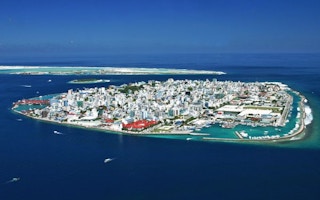The Maldives will seek to fund its plan to become carbon-neutral with voluntary donations from visitors, shunning a proposal for an emissions tax on tourists, President Mohamed Waheed said.
The low-lying Maldives, a chain of islands in the Indian Ocean, is one of the nations most threatened by the rising sea levels predicted from global warming. The previous president, Mohamed Nasheed, pledged to make his country carbon-neutral by 2020, and a report in 2010 that he commissioned suggested a carbon tax on tourism.
“We are careful not to put too many taxes on our tourists,” Waheed said in an interview in Rio de Janeiro, where he’s attending the United Nations Rio+20 summit on sustainability. “What we are now planning to do is set up an environment fund where tourists can commit funds. It will be voluntary contributions to begin with.”
Waheed, who served as Nasheed’s deputy, took power in February after Nasheed resigned. Nasheed later said he was forced to do so at gunpoint by the military. Waheed said he’ll hold elections in “about a year.”
“The constitution allows for an election in July next year, and I have declared I’m fully supportive of it,” Waheed said.
The president said he’ll continue to pursue Nasheed’s policy of carbon neutrality. He’s seeking to derive 60 percent of the country’s electricity from solar power by 2020, with the remainder from other renewable sources such as wind and biomass.
Suzlon talks
The renewables push would slash the nation’s dependence on imported fossil fuels, which currently costs the country $200 million a year, or about 15 percent of its economic output.
To that end, Waheed’s government has been in discussion with Indian and US renewable energy equipment makers, including Suzlon Energy, Waheed said. With the country needing investment and technical assistance to build renewable, he said he hadn’t ruled out a carbon tax on tourists.
“We will discuss with our tourism sector, with tour operators and resort owners to see how much of a burden it would be if we make it mandatory,” Waheed said.
The Maldives at its highest is three meters (10 feet) above sea level. Sea levels may rise by 18 to 59 centimeters (7 to 23 inches) by 2100 as a result of warming temperatures, the UN said in 2007.








